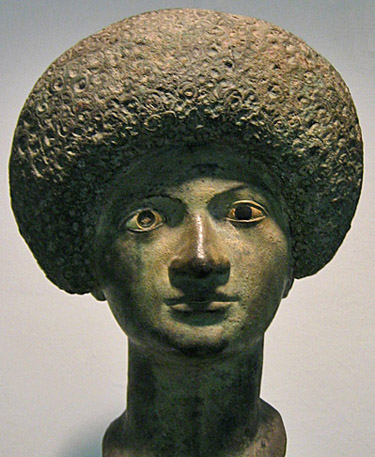 Bronze portrait head, Emporiae (Spain) 1st century CE |
Sophoni(s)ba, daughter of the celebrated Carthaginian general Hasdrubal Son of Gesco, became Queen of Numidia twice over through marriage to two Numidian kings. She enters Roman history briefly toward the end of the 2nd Punic War (218-201 BCE), but her dramatic betrothals, marriages and death in 203 BCE inspired historians from early 2nd century BCE to late 2nd century CE to include her as a significant non-combatant in their narratives (including Livy, AUC 30.12.11-19 and 15.6-9, five are extant: Polybius, The Histories 14.7.6; Diodorus Siculus, Bibliotheca Historica 27.7; Dio Cassius, Roman History 17.57.51 and his epitomizer Zonaras 17.9.11, 12, 13; Appian, Roman History: Punic Wars 8.27-28). Polybius, the earliest source, notes merely that the "female child, daughter of Hasdrubal" (conceivably in her teens!) persuaded her husband, the West Numidian King Syphax, an ally of Rome, to support the Carthaginians against the Romans. In 206 BCE she was betrothed by her father to Syphax, having first been promised (Diodorus Siculus says "married") to the East Numidian King Masinissa, who switched his alliance at this time from Carthage to Rome. While sources differ concerning their motivations, historians agree that Sophoni(s)ba was the pivotal factor in the decisions made by these three men. Dio Cassius follows Livy in proclaiming Sophoni(s)ba's beauty and youthful bloom, adding that she was educated in literature and music. He observes: "she was clever, ingratiating, and altogether so charming that the mere sight of her or even the sound of her voice sufficed to vanquish everyone, even the most indifferent" (17.57.51). In the speech below Livy captures her ability to reason and fascinate as she greets the victorious Masinissa outside her palace at Cirta after Syphax's defeat. She convinces Masinissa to promise not to hand her over to the Romans, a promise which he tries to secure by making her his wife. Questions about her nature and personal agency remain: was she forced into her first marriage, her father's pawn like many daughters in strong patriarchal cultures? was she passionately attached to her country, as Syphax tells Scipio? was she in love with Masinissa or did she intend to use him to save Carthage? did Masinissa force her to drink poison or did she choose death, heroically eluding the Romans she hated and Scipio's triumph? Later art, literature, and music made her the heroine of romance and tragedy. |
| Chapter 12 | ||
| (11) Intranti vestibulum in ipso limine Sophoniba, uxor Syphacis, filia Hasdrubalis Poeni, occurrit; et cum in medio agmine armatorum Masinissam insignem cum armis tum cetero habitu conspexisset, regem esse, id quod erat, rata, genibus advoluta eius |
|
|
| (12) "Omnia quidem ut possis" inquit "in nobis di dederunt virtusque et felicitas tua; sed si captivae apud dominum vitae necisque suae vocem supplicem mittere licet, si genua, si victricem attingere dextram, | ||
| (13) precor quaesoque per maiestatem regiam, in qua paulo ante nos quoque fuimus, per gentis Numidarum nomen, quod tibi cum Syphace commune fuit, per huiusce regiae deos, qui te melioribus ominibus accipiant quam Syphacem hinc miserunt, | ||
| (14) hanc veniam supplici des ut ipse quodcumque fert animus de captiva tua statuas neque me in cuiusquam Romani superbum et crudele arbitrium venire sinas. | ||
| (15) Si nihil aliud quam Syphacis uxor fuissem, tamen Numidae atque in eadem mecum Africa geniti quam alienigenae et externi fidem experiri mallem: quid Carthaginiensi ab Romano, | ||
| (16) quid filiae Hasdrubalis timendum sit vides. Si nulla re alia potes, morte me ut vindices ab Romanorum arbitrio oro obtestorque." | ||
| (17) Forma erat insignis et florentissima aetas. Itaque, cum modo genua modo dextram amplectens, in id ne cui Romano traderetur fidem exposceret propiusque blanditias iam oratio esset quam preces. | ||
| (18) . . . amore captivae victor captus. | ||
| Chapter 15 | ||
| (6) Hunc nuntium ac simul venenum ferens minister cum ad Sophonibam venisset, | ||
| (7) "Accipio" inquit "nuptiale munus, neque ingratum, si nihil maius vir uxori praestare potuit. Hoc tamen nuntia, melius me morituram fuisse si non in funere meo nupsissem." | ||
| (8) Non locuta est ferocius quam acceptum poculum nullo trepidationis signo dato impavide hausit. | ||
Click on the underlined words for translation aids and
commentary, which will appear in a small window. Click on the icon link
![]() to the right of the
text for related images and information.
to the right of the
text for related images and information.